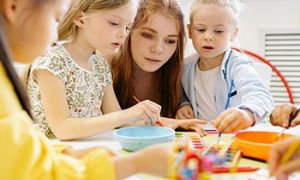Engaging families in early learning is crucial for fostering a collaborative environment that supports children's development. Here are some practical strategies on how to get families involved in their child's learning.
1. Build Strong Relationships
- Communicate regularly: Share updates, achievements, and events through newsletters, emails, or digital platforms.
- Be approachable: Create opportunities for open dialogue where families feel comfortable expressing their thoughts.
2. Involve Families in Activities
- Organize family-friendly events: Plan workshops, storytime sessions, or cultural celebrations that invite active participation.
- Encourage volunteering: Allow parents or caregivers to contribute their skills or time to the classroom.
3. Share Resources and Insights
- Provide learning tools: Offer take-home activities or educational resources that families can use to support their child's learning.
- Educate on child development: Share tips and advice on topics like milestones, play-based learning, or emotional growth.
4. Make Learning Visible
- Display work: Showcase children's projects and achievements in a way that families can see and celebrate.
- Regular progress updates: Share development milestones through meetings, portfolios, or online platforms.
5. Respect Diversity
- Honor cultural backgrounds: Integrate diverse traditions and practices into classroom activities.
- Inclusive communication: Provide materials in multiple languages and consider varying family structures and needs.
6. Offer Flexible Involvement
- Provide options: Acknowledge family time constraints and offer opportunities for engagement that work within their schedules.
- Virtual participation: Use technology for online meetings or events to accommodate families who cannot attend in person.
7. Encourage Two-Way Communication
- Ask for feedback: Seek families’ opinions on curriculum, policies, or activities, making them feel involved in decision-making.
- Collaborate on goals: Work together to set developmental goals for the child that align with both the family's and the center’s vision.
8. Celebrate Achievements Together
- Recognize milestones: Host special events or celebrations to highlight children’s progress and include families in the festivities.
- Express appreciation: Thank families for their involvement and contributions to the learning environment.
Activities To Engage Families
Here are some specific activities to engage families in early learning effectively:
1. Family Storytelling Sessions
-
What to Do: Invite families to share stories, folklore, or traditions from their culture.
-
Why It Works: Encourages cultural exchange, strengthens family connections, and makes children feel proud of their heritage.
2. Take-Home Learning Kits
-
What to Include: Provide kits with simple materials for activities like making playdough, sorting objects by color, or planting seeds.
-
Why It Works: Extends learning into the home and helps families bond while participating in their child’s development.
3. Collaborative Art Projects
-
What to Do: Create a large mural or collage where each family contributes a piece representing their child’s interests or cultural background.
-
Why It Works: Promotes creativity and teamwork while allowing families to leave a lasting mark on the classroom.
4. Parent-and-Child Workshops
-
What to Host: Plan workshops on topics like mindfulness, storytelling, or sensory play, where families can learn hands-on activities to try at home.
-
Why It Works: Offers practical tools for engagement and strengthens the connection between home and school.
5. Cooking Together
-
What to Do: Organize a cooking day where families share simple recipes and cook together with their children.
-
Why It Works: Explores cultural diversity through food while teaching teamwork, measurement, and healthy eating habits.
6. Outdoor Exploration Days
-
What to Do: Arrange nature walks or gardening days where families and children explore the outdoors together.
-
Why It Works: Encourages environmental awareness and creates opportunities for bonding through shared discoveries.
7. Family Reading Challenges
-
What to Do: Set a reading challenge where families log books they read together, with certificates or prizes for milestones.
-
Why It Works: Promotes literacy and makes reading a shared and rewarding experience.
8. Family Feedback Wall
-
What to Set Up: Create a space where families can share suggestions, comments, or positive notes about their child’s learning journey.
-
Why It Works: Encourages two-way communication and helps families feel more connected to the educational process.
9. Cultural Celebration Days
-
What to Host: Celebrate diverse cultures by inviting families to share traditional dances, crafts, or foods during a special event.
-
Why It Works: Builds a sense of belonging and teaches children the value of diversity and inclusion.
10. Create a “Family of the Week” Spotlight
-
What to Include: Highlight one family each week, sharing fun facts, photos, or a “favorite family activity.”
-
Why It Works: Personalizes the classroom experience and makes families feel valued and recognized.
When families are actively involved, it creates a partnership between home and early learning settings. This ensures consistency in a child’s learning experience and fosters a sense of community. Family engagement positively influences children's cognitive, emotional, and social development. Children thrive when their learning is supported both at home and in educational environments.
Further Reading
Supporting Families With Separation Anxiety In Childcare
Building Relationships with Families and Co-Workers
Engaging Families In Early Childhood Education
Preparing For Parent Meetings
Talking To Parents About Their Child's Behaviour Issues
Activity Ideas For Parents In Early Childhood Setting







 As an Educator in Australia, your pay rate falls under the Children’s Services Award 2010. This award states the minimum amount that an employer can
As an Educator in Australia, your pay rate falls under the Children’s Services Award 2010. This award states the minimum amount that an employer can When working as a qualified Early Childhood Teacher (with a university degree) within a service, your rate of pay will come from the Educational Services
When working as a qualified Early Childhood Teacher (with a university degree) within a service, your rate of pay will come from the Educational Services When working as a Diploma Qualified Educator your pay rate is from the Children's Services Award 2010. This Award states your minimum rate of pay
When working as a Diploma Qualified Educator your pay rate is from the Children's Services Award 2010. This Award states your minimum rate of pay When working as a Cert 3 Qualified Educator, your pay rate is from the Children's Services Award 2010. This Award states your minimum rate of
When working as a Cert 3 Qualified Educator, your pay rate is from the Children's Services Award 2010. This Award states your minimum rate of Educational Leaders play a crucial role in their early childhood service by ensuring that the educational program aligns with best practices and supports the holistic
Educational Leaders play a crucial role in their early childhood service by ensuring that the educational program aligns with best practices and supports the holistic In early childhood education and care, ratios are more than a technicality—they are a frontline safeguard. Every child deserves responsive supervision, emotional connection, and developmental
In early childhood education and care, ratios are more than a technicality—they are a frontline safeguard. Every child deserves responsive supervision, emotional connection, and developmental With the new national child safety reforms kicking in on 1 September 2025, early childhood services like yours have a real opportunity to lead the
With the new national child safety reforms kicking in on 1 September 2025, early childhood services like yours have a real opportunity to lead the Here’s a comprehensive Mobile Phone and Smart Watch Policy tailored for early childhood education and care (ECEC) services in Australia, aligned with the latest 2025
Here’s a comprehensive Mobile Phone and Smart Watch Policy tailored for early childhood education and care (ECEC) services in Australia, aligned with the latest 2025 The Sea of Fish Challenge is a national initiative that invites children, educators, families, and communities to create and display fish artworks as a symbol
The Sea of Fish Challenge is a national initiative that invites children, educators, families, and communities to create and display fish artworks as a symbol Across the early childhood education and care sector, educators are sounding the alarm: current staffing ratios are insufficient to deliver safe, meaningful, and developmentally appropriate
Across the early childhood education and care sector, educators are sounding the alarm: current staffing ratios are insufficient to deliver safe, meaningful, and developmentally appropriate


